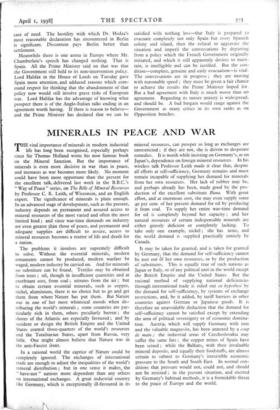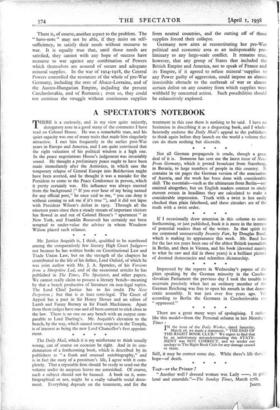MINERALS IN PEACE AND WAR
THE vital importance of minerals in modern industrial life has long been recognised, especially perhaps since Sir Thomas Holland wrote his now famous book on the Mineral Sanction. But the importance of minerals is even more decisive in war than in peace, and increases as war becomes more likely. No moment could have been more opportune than the present for the excellent talk, delivered last week in the B.B.C.'s " Way of Peace " series, on The Role of Mineral Resources by Professor C. K. Leith, of Wisconsin, and an Engligh expert. The significance of minerals is plain enough. In an advanced stage of development, such as the present, industry depends on permanent and assured access to mineral resources of the most varied and often the most limited kind ; and since war-time demands on industry are even greater_xliiii those of peace, and permanent and adequate supplies are difficult to assure, access to mineral resources becomes a matter of life and death for a nation.
The problems it involves are supremely difficult to solve. Without the essential minerals, modern armaments cannot be produced, modern warfare be waged, modern industry be carried on. And for minerals no substitute can be found. Textiles may be obtained from trees ; oil, though in insufficient quantities and at exorbitant cost, from coal ; nitrates from the air ; but to obtain certain essential minerals, such as copper, nickel, aluminium, there is no choice but to go and get them from where Nature has put them. But Nature was in one of her most whimsical moods when dis- tributing the world's minerals ; some countries are par- ticularly rich in them, others peculiarly barren ; the shores of the Atlantic are especially favoured ; and by accident or design the British Empire and the United States control three-quarters of the world's resources and the Totalitarian States, apart from Russia, very little. One might almost believe that Nature was in the anti-Fascist front.
In a rational world the caprice of Nature could be completely ignored. The exchanges of international trade are enough to adjust the inequalities of the world's mineral distribution ; but in one sense it makes the " have-not " nations more dependent than any others on international exchanges. A great industrial country like Germany, which is exceptionally ill-favoured in its mineral resources, can prosper so long as exchanges are unrestricted ; if they are not, she is driven to desperate remedies. It is worth while insisting on Germany's, as on Japan's, dependence on foreign mineral resources. In his wireless talk Professor Leith made it clear that, despite all efforts at self-sufficiency, Germany remains and must remain incapable of supplying her demand for minerals from her own resources. Her lack of rubber may be, and perhaps already has been, made good by the pro- duction of the excellent substitute Buna. With great effort, and at enormous cost, she may even supply some 4o per cent. of her present demand for oil by producing it from coal. To supply her entire war-time demand for oil is completely beyond her capacity ; and her natural resources of certain indispensable minerals arc either gravely deficient or completely lacking. To take only one example, nickel ; she has none, and the world demand is supplied practically entirely by Canada.
It may be taken for granted, and is taken for granted by Germany, that the demand for self-sufficiency cannot be met out Of her own resources, or by the production of substitutes. This is equally true of such nations as Japan or Italy, or of any political unit in the world except the British Empire and the United States. But the rational method of supplying national deficiencies through international trade is ruled out ex hypothesi by the demand for self-sufficiency, by systems of exchange restrictions, and, be it added, by tariff barriers in other countries against German or Japanese goods. It is therefore an unavoidable deduction that the demand for self-sufficiency cannot be satisfied except by extending the area of political sovereignty or of economic domina- tion. Austria, which will supply Germany with iron and the valuable magnesite, has been annexed by a coup de main ; the industrial areas of Czechoslovakia may suffer the same fate ; the copper mines of Spain have been seized ; while the Balkans, with their invaluable mineral deposits, and equally their foodstuffs, are almost certain to submit to Germany's irresistible economic pressure to the South and South East. In normal con- ditions that pressure would not, could not, and should not be resisted ; in the present situation, and exerted by Germany's habitual methods, it is a formidable threat to the peace of Europe and the world. There is, of course, another aspect to the problem. The " have-nots " may not be able, if they insist on self- sufficiency, to satisfy their needs without recourse to war. It is equally true that, until those needs are satisfied, they cannot with any hope of success have recourse to war against any combination of Powers which themselves are assured of secure and adequate mineral supplies. In the war of 1914-1918, the Central Powers controlled the resources of the whole of pre-War Germany, including the ores of Alsace-Lorraine, and of the Austro-Hungarian Empire, including the present Czechoslovakia, and of Rumania ; even so, they could not continue the struggle without continuous supplies from neutral countries, and the cutting off of those supplies forced their collapse.
Germany now aims at reconstituting her pre-War political and economic area as an indispensable pre-. liminary to any large-scale conflict. It remains true, however, that any group of States that included the British Empire and America, not to speak of France and its Empire, if it agreed to refuse mineral "supplies to any Power guilty of aggression, could impose an almost irresistible obstacle to the outbreak of war or almost certain defeat on any country from which supplies were withheld by concerted action. Such possibilities should be exhaustively explored.















































 Previous page
Previous page